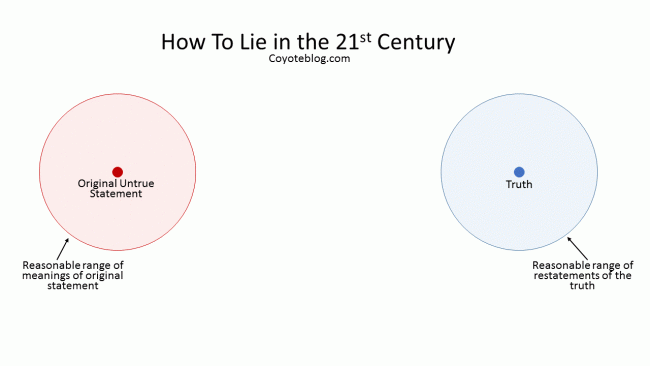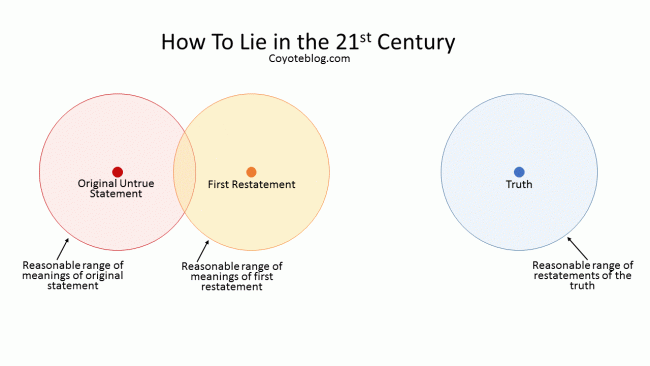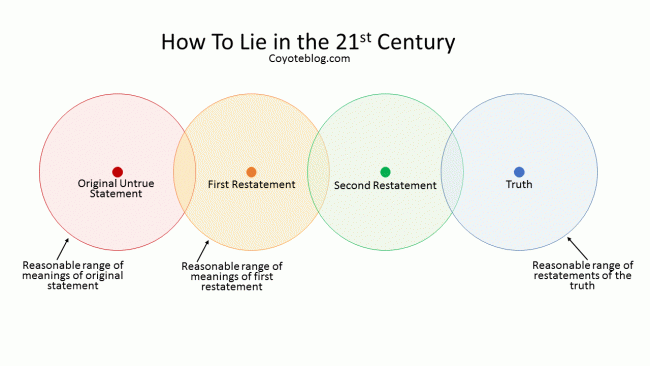Lying is an old, old skill among politicians. What is new in the 21st century is that with the advent of the Internet and alternative media, it is much more likely for a politician to get caught publicly in a lie. Based on my observations over the last year of the political-media process, here is my brief guide for politicians on how to lie, or more accurately, how to manage affairs when caught lying.
First, there must be a lie, as represented by this chart:

There is some underlying truth out there (shown with the blue dot), and given the squishiness of the English language at times, there are a variety of ways that truth could reasonably be restated, shown by the blue circle around it. On the left we will assume someone has lied or made an incorrect statement about that truth, and again there is a reasonable range of meanings around that untrue statement, shown by the red circle around it. Note that the reasonable range of meanings for the original statement do not encompass the truth.
So what happens next? Well, one possibility is that no one calls you on the untruth. Congratulations, you are done! The other possibility, though, is that some crazy dude on the Internet found a cell phone video embedded in a World of Warcraft chat room that reveals you did not tell the truth. So what now?
The thing to remember at this point is that you have two assets. First, you presumably have supporters. Your supporters want to believe you. They are looking for some explanation or statement from you that is even minimally convincing, and they are ready to trumpet that explanation like it is the Word of God to the rest of the world.
Your second asset is the media. Your original lie was maybe a week ago. That is the Jurassic Period for the media. They don't have the staff to track down what is happening today, much less go back over something from a week ago.
Taking these two assets in mind, you are going to restate your original untrue statement, as so in orange:

The key for this to work is to make sure the range of meanings from your original statement and the range of possible meanings from your new statement overlap. By doing so, you haven't admitted to lying or changed your position -- you have clarified. Cognitive dissonance in your supporters will cause their brains to immediately substitute all instances of your first statement in their memories with your new restatement.
OK, but what happens when that dude in his pajamas does it again, and claims you are still lying with your new restatement. What do you do? Same thing as last time: another restatement. If necessary, you will keep restating until the range of meanings of your restatement overlaps with the truth:

Yay! You are done. If you really want to win the news cycle, take your final restatement to Politifact and get them to rate it as mostly true. Sure, some crazies on the other side of the aisle are going to be screaming that the ultimate truth does not at all resemble your original statement, but just claim that they are dredging up old news and that it has already been settled. For extra points, if you are a female and/or the member of an ethnic minority, claim discrimination, saying that the opposition is driven by racism, misogyny, etc.
I think this is all clearer with an example. So let's take the case of Philander J. Donkeyphant, who is running for reelection. Phil decides to lie about the vehicle he was driving yesterday. Why does he lie? Who knows, but Phil is a successful politician and senior government official and therefore one of our betters and let's not question his tactics. So let's see how his lie plays out:
Lie: I drove a red car yesterday
Soon, Philander has a problem. Some crazy lady finds a traffic camera video and proves no red car drove by that could have been Philander's. So Phil is forced into his first restatement:
First Restatement: I was driving a deep-red pickup truck
A bit of a stretch but we can't really call it changing his story, since many folks might refer to the family car and actually be talking about a pickup truck. And the "deep red" comment seems downright helpful, trying to provide more detail. But wouldn't you know it, that lady can't find any deep red pickup trucks on camera. So Phil moves to his second restatement:
Second Restatement: I was driving a violet truck.
Again, a bit of a stretch, but violet is not far from deep-red. He has dropped the detail of it being a pickup truck, now it is just a truck, but still arguably consistent with his immediately previous statement.
Finally, our annoying blogger-lady finds Philander and his vehicle on a video. It turns out:
Truth: He was driving a purple 18-wheeler.
When shown the video, old Phil says, "Sure, that's what I said. A violet truck. Obviously my opposition has nothing better to do than make stupid issues like this out of nothing. Politifact confirms that "violet truck" is a truthful way to describe a "purple 18-wheeler" so the issue is closed.




